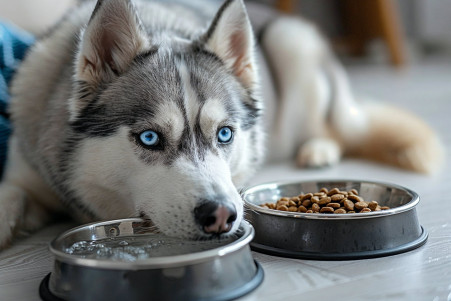Dog Not Eating But Drinking Water and Vomiting: Causes and What to Do
7 May 2024 • Updated 7 May 2024

If your dog is vomiting, not eating, and drinking water, there are many reasons why this could be happening, some of which are relatively minor and others that are more serious. In dogs, vomiting and lack of appetite can be caused by dietary indiscretion, infections, pancreatitis, liver or kidney disease, gastrointestinal obstruction, and other conditions - many of which are urgent and require a trip to the vet.
By looking at the potential causes and what to do about a dog not eating but drinking water and vomiting, we will reference veterinarians and scientific research on dog digestive problems. This information will help you understand the signs to look out for, how to respond, and when to know if you need to get professional help to ensure your furry friend feels better soon.
What are the possible reasons why a dog might be vomiting, not eating, and drinking water?
Potential Causes: Why Dogs Stop Eating But Continue Drinking
There are many potential causes of a dog not eating but still drinking water and vomiting. These include an upset stomach, dental issues, infections, parasites, toxin ingestion, and a foreign body in the digestive tract. All of these problems can lead to nausea, pain, or an obstruction that makes eating difficult, but drinking water can help soothe the stomach, flush out toxins, or lubricate the digestive tract, according to PetMD.
In addition, certain medical conditions, such as gastrointestinal problems, organ failure, dental disease, and cancer, can lead to a decrease in a dog's appetite, as noted by Bond Vet. For example, inflammatory bowel disease and stomach ulcers can cause nausea and a loss of appetite, while kidney failure and pancreatitis can cause a dog to feel sick and lose interest in food. Meanwhile, dental issues, such as loose teeth and oral tumors, can make eating uncomfortable for older dogs, according to Cutting Blue Farms.
Behavioral causes, such as stress, fear, anxiety, and phobias, can also lead to a loss of appetite, according to PetMD. In these cases, medications may be necessary to help control severe behavioral problems and increase a dog's appetite. It's important to determine the root cause of the problem so that the appropriate treatment can be administered and the dog can be encouraged to eat again, whether the cause is a medical condition, an obstruction, or a behavioral issue. With that in mind, let's take a look at some home remedies and methods for getting a dog to eat.
At-Home Solutions and Tips to Stimulate Appetite
If your dog is drinking water but not eating and they are still drinking water, Shameless Pets says there are a few things to keep in mind. First, the food itself may be the issue, so make sure to check the smell, texture, and expiration date. Dental or mouth issues may also be to blame, so make sure to check your dog's teeth and gums. Finally, stomach issues are a common cause, and they may be accompanied by vomiting, constipation, or diarrhea.
For stomach issues, WebMD says to try easy-to-digest, natural foods like pumpkin, sweet potato, or chicken. If your dog is experiencing mouth pain, you can also try softening their food by adding warm water. To stimulate your dog's appetite, try feeding them smaller, more frequent meals and consider hand-feeding them or giving them treats. Make sure to keep fresh water available to prevent dehydration, which can further decrease your dog's appetite.
According to Dr. Phillips Animal Hospital, other at-home solutions include warming up your dog's food to make it smell better, adding broth to their food for extra flavor, and even trying baby food. You can also let your dog eat grass to help them vomit and relieve their stomach issues. However, if your dog continues to vomit, it's time to take them to the vet.
When to Go to the Vet
If your dog has stopped eating for longer than a couple of days, it's time to visit the vet. This could be a sign of a more serious issue. Dog Snob explains that hyporexia can be caused by a number of things, including stress, nausea, dental disease, gastrointestinal issues, or environmental changes.
Other signs to look out for that warrant a trip to the vet include increased water consumption, vomiting, diarrhea, lethargy, or any other unusual behavior, as noted by T&C Vets. In addition, some dogs, including puppies, senior dogs, and dogs with preexisting conditions, may need to be seen by a vet sooner.
The Daily Paws also notes that if your dog continues to refuse food, it can lead to dehydration, organ damage, and even death. This means that if your dog doesn't start eating again after trying some home remedies, you should contact your vet for an evaluation and treatment. This way, you can ensure that your dog is treated for the underlying cause and can get back to eating normally.
Appetite Stimulants and Veterinary Treatments
If your dog is refusing to eat but still drinking water, a vet may prescribe medications or other treatments to help stimulate their appetite. According to HolistaPet, some of the most common appetite stimulants that vets prescribe are mirtazapine, which is an appetite stimulant and serotonin reuptake inhibitor, and newer drugs like Entyce, which is a ghrelin mimetic.
For dogs that are difficult to medicate orally, Dr. Buzby's ToeGrips for Dogs explains that compounded medications such as flavored liquids or transdermal creams may be available. In addition to medications, vets may also recommend other treatments like acupuncture or CBD to help with pain relief and appetite stimulation.
The treatment plan will vary based on the specific cause of the dog's loss of appetite that's identified during the vet's assessment, according to PetMD. It's important to make sure that you follow your vet's advice and treatment plan to ensure that the underlying cause is addressed and your dog starts eating again. That said, it's important to note that appetite stimulants should always be used under the care of a licensed vet since they may not be safe for all dogs or all situations.
It's also important to make sure that you continue to monitor your dog's hydration levels since dehydration can become a serious issue quickly if your dog is refusing to eat.
How to Tell If Your Dog Is Dehydrated
Making sure that a dog is drinking water is important, even if they aren't eating, because dehydration can set in quickly and cause other health problems. Daily Paws notes that some signs of dehydration in dogs include dry gums, sunken eyes, and skin that doesn't snap back when it's pulled up. If a dog is refusing to drink water, ice cubes, Pedialyte, or other hydrating fluids can be used to encourage them to drink.
Canine Journal explains that severe dehydration can be fatal and requires immediate medical attention. Dehydration can set in within 24 hours and can cause organ damage or organ failure if it's not treated. The Dodo adds that other symptoms of dehydration include panting, weakness, refusing to eat, a dry nose, and thick drool.
It's important to make sure that a dog is drinking water and to monitor them for dehydration because dehydration can make the underlying issue that's causing a dog to refuse to eat worse. If a dog becomes severely dehydrated, it's important to make sure that they get medical treatment to ensure that they don't suffer any long-term health problems.
Conclusion: Dealing With Your Dog's Loss of Appetite
If your dog is not eating, the condition is referred to as anorexia. Pseudoanorexia is when a dog is willing to eat but is unable to do so due to a physical issue, according to PetMD.
Medical reasons for a dog's loss of appetite include gastrointestinal disease, digestive tract obstruction, organ failure, dental problems, cancer, and orthopedic issues. Loss of appetite can also be due to stress and anxiety, which may need to be treated with medication, according to PetMD.
If your dog has not eaten for a day or more, especially two days or more, contact your vet. Puppies, diabetic dogs, and dogs with other symptoms such as vomiting or lethargy should be seen by a vet right away, according to Just Food for Dogs.
Ways to get a dog to eat include feeding them at set times, adding water or warming up their food, trying different flavors, and increasing their exercise, according to Just Food for Dogs. Your vet may also prescribe appetite stimulants.
Make sure to watch your dog's water intake, as dehydration can be life-threatening if your dog isn't eating, according to Raised Right Pets. It's important to get your dog to the vet as soon as possible to treat the underlying cause and prevent further complications.
By taking proactive steps and following the guidance of a qualified veterinarian, pet owners can help ensure the well-being and full recovery of their beloved canine companions.


